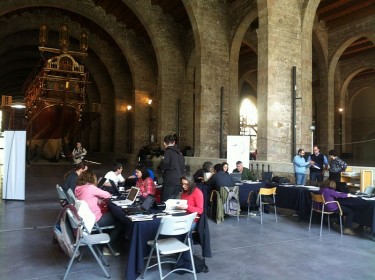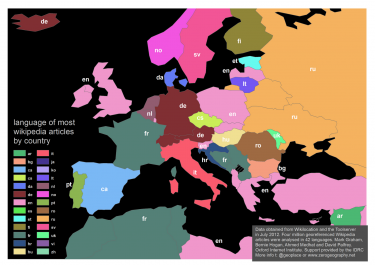The Catalan edition of Wikipedia Viquipèdia, a fundamental support to a language and culture historically discriminated against because it belongs to a stateless nation, has registered a record number of active users, with its article count reaching 400,000.
Viquipèdia contains half as many articles as the Spanish Wikipedia, even though 420 million people speak Spanish in the world, and there are under 10 million Catalan speakers.
At a time when Catalonia is involved in a debate about becoming independent from Spain, Viquipèdia‘s role in raising global awareness about the region and its people has increased massively. This is one of the main motivations that compels 1600 active Catalan Wikipedists to edit.
Viquipèdia's first article [ca] was the first non-English article to go live on Wikipedia. It was published only two months after the original version of the Wikipedia in English went live. Out of the free encyclopedia's 285 language editions, Catalan Wikipedia now ranks at number 15 in terms of article count. It occupies first place in an index compiled by the Wikimedia Foundation, which measures the quality of the thousand most important articles.
On the evening of 12 April 2013, the Viquipèdia article counter reached 400,000 [ca]. Everyone had been preparing to celebrate the milestone for a while, and it finally arrived with article Heli-4 [ca]. This is how David Parreño (@dapamont), 17 year-old active Wikipedist and Wikimediacat (@Wikimediacat) communications coordinator, announced it [ca]:
@dapamont: URGENT | Nota: La Viquipèdia en català assoleix els 400.000 articles i marca el rècord d'usuaris actius http://ves.cat/dJrG
#viquipèdia
@dapamont: URGENT | Notice: Wikipedia in Catalan reaches 400,000 articles and registers a record number of active users http://ves.cat/dJrG
#Wikipedia.
Tool for Defending Catalan Culture
The Catalan version of Wikipedia is unique, because it has become central to the activism around the language.
According to a study by Amical Viquipèdia (@Wikimediacat), the association that promotes the free encyclopedia among the Catalan community, this is one of the main motivations that compel Catalan Wikipedists to edit. Àlex Hinojo (@Kippelboy), project manager at Wikimediacat [ca] and creator of@CatalanMuseums, says [ca]:
Molta gent diu que edita perquè és divertit, per aprofundir en un tema…i per fer país. Com en altres temes, la societat civil catalanoparlant sempre manté un cert activisme en favor de la seva llengua.
Many people say they edit because it's fun, they can provide more information about a topic…and they are building a country. Catalan-speaking civil society always maintains a certain activism in favour of its language, just as it does with other topics.

WikiMarathon at Drassanes Reials (Barcelona), on Wikipedia's 12th anniversary. March 2013. Photo by @Kippelboy.
Tension with the Spanish Version
A study by Mark Graham (@geoplace), researcher at Oxford University, based on figures obtained by combining geolocated data from WikiLocation and Georeferenzierung, shows that 35,000 articles have been created in Spanish territory with coordinates in Catalan, and nineteen thousand in Spanish. According to Graham, “nowhere else in the world enjoys such a high visibility for a language that is relatively little spoken.”
Viquipèdia is viewed by Catalan-speaking users as a tool for defending their culture, which can occasionally create friction with the Spanish edition due to the issue of identity. Wikipedists not only translate; they often bring their own cultural perspective, which can clash with other cultural perspectives. Despite the desire to understand, conflicts are not always easily resolved. A news item that appeared in the digital newspaper Vilaweb [ca] in December 2012, told how blogger Joan Inglada [ca] (@jinglada) translated the entry about writer Anna Rosselló [es] into Spanish, but another Wikipedist changed ‘Catalan writer’ to ‘Spanish writer in Catalan language’, even against Rosselló's will. In the end, Inglada requested the article be removed. Because of this, Inglada investigated other articles, such as the one about Valencian author and reference in Catalan culture, Joan Fuster, and found identical corrections, as detailed in an entry in his blog [ca].
The Fight for their own Chapter
For years, Catalan Wikipedists have been negotiating with the Wikimedia Foundation, the international Foundation that promotes Wikipedia and its sister projects, to obtain official recognition for the Catalan version, since the organisational structure of the free encyclopaedia is based on border criteria and Catalonia is a stateless nation. Hinojo says [ca]:
Existeixen diverses associacions locals arreu del món anomenades “chapters”. El que passa és que aquestes associacions es basen en delimitacions frontereres i nosaltres ens basem en interessos temàtics (la cultura catalana), i no fronterers. En ser un país sense Estat, vam proposar a la Wikimedia Foundation que ens donés un “reconeixement oficial” com a “chapter” i portem més de 4 anys de negociacions. Encara no tenim l'aprovació oficial.
There are different local associations around the world called “chapters”. These associations are based on border boundaries and we are based on topical interests (Catalan culture), not borders. Since we are a stateless nation, we suggested that the Wikimedia Foundation give us “official recognition” as a “chapter” and we've been in negotiation for over 4 years. We still don't have official approval.
As a temporary solution to this situation, the Amical Viquipèdia (@WikimediaCat) was created in 2008 to pave the way. This association, which currently has around 60 members, promotes the online encyclopaedia in Catalan through activities such as WikiMarathons, competitions in schools, and collaborations with institutions such as universities, museums and libraries.








7 comments
Catalan Wikipedia. Or how to invent the history: Spain did not exist at Expo 1888, either in the Olympics in 1992. Why this errors and inaccuracies? because it is forbidden to put a flag of Spain in this wikipedia controlled by three or four extreme nationalists. Mother of God, Spain did not exist in 1992 … wtf …
I respect the fight against monorchid dictator from NationalCatholicism, (PPSOE), and the right to speak any language, but I DON’T RESPECT LIES AND SUSPICIOUS NATIONALIST “STRANGE INNACCURACIES” Sorry, Spain DID exist in 1888 and 1992